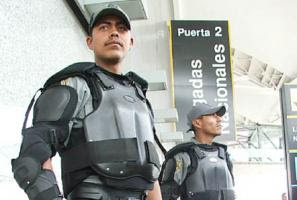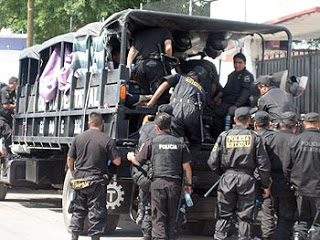Want To Do Something About Immigration? End the “War on Drugs”
 Militarizing Mexico: What “bi-national” cooperation in the “War on Drugs” has wrought.
Militarizing Mexico: What “bi-national” cooperation in the “War on Drugs” has wrought.
“You can’t buy those two together,” the checkout clerk informed me, referring to two over-the-counter children’s cold remedies. “The computer won’t let me process the purchase.”
“Oh,” I replied, a puzzled scowl taking possession of my face, “this must be one of those oh-so-helpful `war on drugs’ measures — like the restrictions on buying pseudoephedrine.”
My comment was overheard by the man standing in line behind me, a pleasant fellow with a four-year-old son in tow. About ten years younger than myself, the man had much the same build and a government-issue tonsure. The only way it could have been more obvious that he was a police officer would have been for him to Taze somebody unnecessarily while nibbling on a crueller.
In reply to my complaint, the off-duty cop piously described restrictions on the purchase of children’s cold medicine as “just one of the little sacrifices we have to make in order to protect our children.”
“`Protect’ them — from ourselves?” I asked him, incredulity teaming with frustration to carve an even deeper furrow in my already well-lined forehead.
The sniffling season is upon us, and the air resounds with anguished hacking coughs and becomes clotted with the signature scent emitted by menthol-laden unguents (perhaps the next remedy to be banned by our gun-toting babysitters). Each expression of respiratory distress should offer a reminder of the totalitarian reach of the so-called USA PATRIOT Act, the revised version of which bans the unrestricted sale of psuedoephedrine products as a way of supposedly fighting the scourge of methamphetamine.
In this way, the “War on Drugs” was blended with elements of what the verbally inept man-child in the Oval Office calls the “War on Tare” — thereby making potential terrorists out of Americans who find some way to buy “too much” Claritin D (the good stuff, not the government-friendly substitutes, which are little better than placebos).
While cold, flu, and allergy sufferers endure asinine restrictions on, and federal scrutiny of, their consumption of over-the-counter remedies, hardened convicts in prisons can obtain pretty much any narcotics of any variety in any amount anytime they want to, or even (as I Was The State points out) start drug-smuggling syndicates.
I grant that the restrictions on cold and allergy treatments are annoyances, rather than hardships … at present. Relatively few Americans are outraged over the way that the “War on Drugs” has turned the police into an army of occupation, with a mandate to mount armed no-knock raids in the wee hours of the morning or flat-out steal tens of thousands of dollars at whim in the name of “asset forfeiture.”
Unless you’re the one thrown face-down on the floor of your home by armed intruders, or whose life savings are brazenly stolen from you, chances are these atrocities don’t make you anywhere near as angry as you should be.
If Americans were even half as outraged over those atrocities as they are over illegal immigration, that front of the war on freedom would be shut down tomorrow. Tragically, most Americans who are exercised over immigration — which is to say, Mexican immigration — don’t understand the key role played by the “War on Drugs” in fomenting violence and corruption in Mexico.
The War on Illegal Immigration is beginning to remind me a great deal of the kindred “wars” on terror and drug use: In each case, the targeted problem grows worse, the State grows bigger and bloodier, and the sphere of individual freedom gets smaller.
In the case of immigration, one current “solution” is for municipal governments to criminalize commerce with suspected illegal immigrants, and to conscript merchants, landlords, and others to enforce those laws. The result is severe government-imposed restrictions on lawful commerce, enforced through a network of informants: Stalinism in one city, as it were. At least one city that tried that approach suffered dramatic and painful economic contraction and decided to reverse course. And even larger impediments to freedom of movement are coming, in the form of a national ID card and restrictions on the freedom of travel historically enjoyed by US citizens.
For those who want to reduce the problem of unregulated immigration from Mexico without adding another cubit to the stature of our garrison state, one obvious course of action would be to call off the war on drugs.

The Mexican government, which is the dominant element of that unfortunate nation’s many interlocking criminal syndicates, has profited enormously since Richard Nixon declared “war” on narcotics use in June, 1971. That’s because the Mexican regime is double-dipping: It gets a huge slice of the drug profits, and tens of billions of dollars in counter-narcotics aid from Washington.
A recent Government Accountability Office report (.pdf) documented that, after three and a half decades and tens of billions of dollars invested in “bi-national” counter-narcotics efforts with Mexico, that country is now the major source of practically every variety of narcotics consumed in the United States. In addition, “Mexican drug trafficking organizations operate with relative impunity along the U.S. border and in other parts of Mexico, and have expanded their illicit business to almost every region of the United States.”
Once again, that’s a description of the results after decades of concerted, expensive anti-drug activism. Surely, we could have achieved more or less the same result if Washington had done nothing. Ah, but that approach would have offered no profit to the political class here and in Mexico — and that, after all, is the entire point of this exercise.
Mexican President Felipe Calderon, mimicking his less literate U.S. counterpart, has used the pretext of the drug war to build a “unitary executive” office, the unveiling of which would stir Dick Cheney’s long-dormant loins. He has amassed dictatorial powers and unleashed the military, with predictable results: Lethal, terroristic violence is rampant in Mexico, leaving some parts of that country looking like Baghdad outside the Green Zone.
Obviously, this state of affairs has done nothing to relieve the internal pressures that do a lot to drive Mexicans north of the border. Just as obviously, the policy that created this mess is good for nobody on either side of the border.

So of course, Congress — ever in search of stronger wine, madder music, and the worst possible policy prescriptions — is prepared to spend $1.4 billion on “Plan Mexico,” an escalation in the drug war modeled on “Plan Colombia.” The predecessor has been so successful that Colombia, once a crime-infested country that supplied a majority of American-consumed cocaine, is now … a country plagued by ubiquitous violence and persistent civil war that now supplies ninety percent of American-consumed cocaine.
Great googlymoogly, if Congress is going to send $1.4 billion to Mexico on the pretext of “fighting” drugs, why doesn’t it simply earmark equal shares for that nation’s five leading drug syndicates, and cut out the government entirely?
Here’s something people concerned about illegal immigration, and the process of North American “integration,” could do in the immediate term: Contact your Congress-entity and tell him, her, or it to vote against “Plan Mexico,” a more honest label for which would be the “Drug Syndicate Price Support and Illegal Immigration Subsidy Act of 2007.”
Please be sure to visit The Right Source and the Liberty Minute archive.
Content retrieved from: http://freedominourtime.blogspot.com/2007/10/want-to-do-something-about-unregulated.html.



